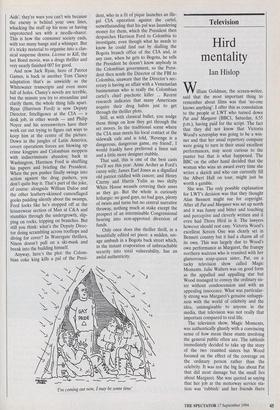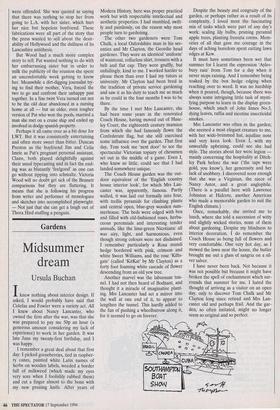Television
Hird mentality
Ian Hislop
William Goldman, the screen-writer, said that the most important thing to remember about films was that 'no-one knows anything'. I offer this as consolation to the people at LWT who turned down Pat and Margaret (BBC1, Saturday, 8.55 p.m.), having paid for the script. The fact that they did not know that Victoria Wood's screenplay was going to be a win- ner and that her usual repertory company were going to turn in their usual excellent performances, may seem curious to the punter but that is what happened. The BBC on the other hand decided that the woman who wins an award every time she writes a sketch and who can currently fill the Albert Hall on tour, might just be worth a gamble.
She was. The only possible explanation for LWT's decision was that they thought Alan Bennett might sue for copyright. After all Pat and Margaret was set up north and it was funny and bitter and touching and perceptive and cleverly written and it even had Thora Hird in it. The lawyers however should rest easy. Victoria Wood's excellent Screen One was clearly set in Bennett country but it had a charm all of its own. This was largely due to Wood's own performance as Margaret, the frumpy northern waitress who is reunited with her glamorous soap-queen sister, Pat, on a tacky television show called Magic Moments. Julie Walters was on good form as the appalled and appalling star but Wood managed to convey the ordinary sis- ter without condescension and with an appealing innocence. What was particular- ly strong was Margaret's genuine unhappi- ness with the world of celebrity and the idea, unimaginable to anyone in the media, that television was not really that important compared to real life.
The television show, Magic Moments, was authentically ghastly with a convincing sense of how mean these stunts involving the general public often are. The tabloids immediately decided to take up the story of the two reunited sisters but Wood focused on the effect of the coverage on the ordinary person rather than the celebrity. It was not the big lies about Pat that did most damage but the small lies about Margaret. She was quoted as saying that her job at the motorway service sta- tion was 'rubbish' and her friends there were offended. She was quoted as saying that there was nothing to stop her from going to L.A. with her sister, which hurt her nice but hopeless boyfriend. These fabrications were all part of the story that the press wanted to sell about the desir- ability of Hollywood and the dullness of its Lancashire antithesis.
But Wood had a much more complex story to tell. Pat wanted nothing to do with her embarrassing sister but in order to milk the publicity of the reunion she spent an uncomfortable week getting to know her. Meanwhile a dirt-digging journalist try- ing to fmd their mother, Vera, forced the two to go and confront their unhappy past together. In a fine twist Vera turned out not to be the old dear abandoned in a nursing home at all — but an older, even tougher version of Pat who won the pools, married a man she met on a cruise ship and ended up involved in dodgy spanish property.
Perhaps it all came over as a bit dour for LWT. But it was consistently entertaining and often more sweet than bitter. Duncan Preston as the boyfriend Jim and Celia Imrie as Pat's pregnant personal assistant, Claire, both played delightfully against their usual typecasting and in fact the end- ing was as blatantly leelgood' as one can go without tipping into schmaltz. Victoria Wood will no doubt get sick of the Bennett comparisons but they are flattering. It means that she is following his progress from writer and performer of monologues and sketches into accomplished playwright: — Not just that she can get a laugh out of Thora Hird stuffing a penguin.



























































 Previous page
Previous page